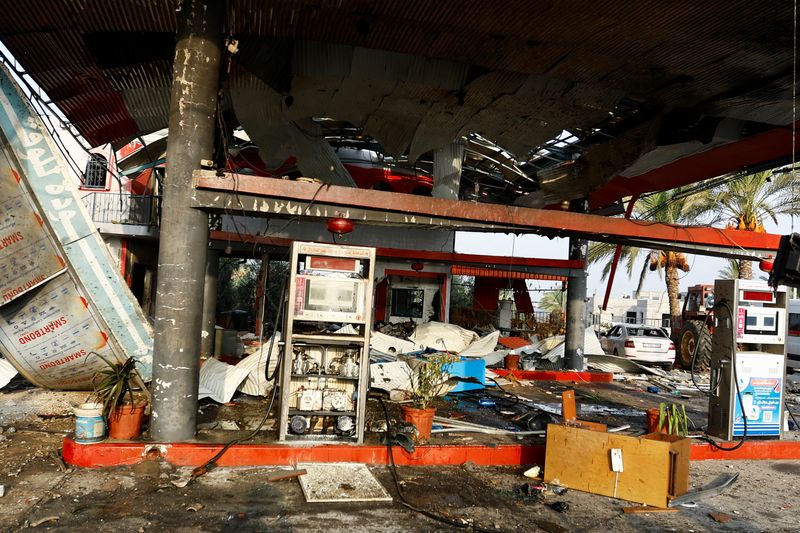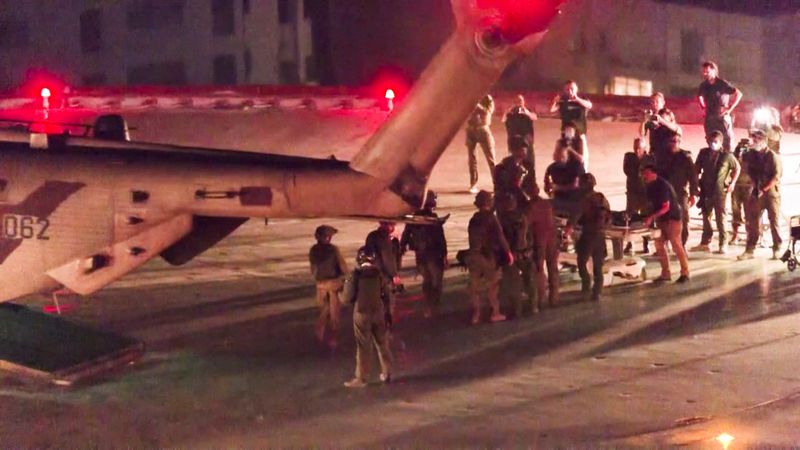By Nidal al-Mughrabi and Emily Rose
GAZA/JERUSALEM (Reuters) -The United Nations, United States and Canada appealed on Tuesday for a humanitarian pause in the Israel-Hamas war to allow safe deliveries of aid to civilians short of food, water, medicine and electricity in the Israeli-besieged Gaza Strip.
International pressure for unimpeded aid to Gaza rose as the health ministry in the Hamas-ruled coastal territory said Israeli air strikes had killed more than 700 Palestinians overnight. Ministry spokesman Ashraf Al-Qidra said this was the highest 24-hour death toll in Israel's two-week-old siege.
U.N. agencies were pleading "on our knees" for emergency aid to be let into Gaza unimpeded, saying more than 20 times current deliveries were needed to support the narrow strip's 2.3 million people amid widespread devastation from Israel's aerial blitz.
Eight trucks containing water, food and medicine entered the Gaza Strip from Egypt late on Tuesday, the Palestinian Red Crescent said.
The United States is negotiating with Israel, neighbouring Egypt and the U.N. to smooth emergency deliveries into Gaza, but have wrangled over procedures for inspecting the aid and over bombardments on the Gaza side of the border.
"While we remain opposed to a ceasefire, we think humanitarian pauses linked to the delivery of aid that still allow Israel to conduct military operations to defend itself are worth consideration," a senior U.S. official said.
Jordanian Foreign Minister Ayman Safadi said after a United Nations Security Council meeting that Israel appeared to be above international law and urged an end to what he termed "double standards" in dealing with the Gaza conflict.
In a statement released on social media, the Palestinian health ministry said at least 5,791 Palestinians had been killed by Israeli bombardments since Oct. 7, including 2,360 children. Some 704 were killed in the previous 24 hours alone, it said.
Reuters could not independently verify the ministry figures.
ISRAEL HITS HAMAS TARGETS
The Israeli military said that it killed dozens of Hamas fighters overnight while hitting over 400 Hamas targets, but that it would take time to destroy the Islamist militant group whose deadly cross-border attack on Oct. 7 stunned Israel.
U.N. Secretary-General Antonio Guterres pleaded on Tuesday for civilians to be protected, voicing concern about "clear violations of international humanitarian law" in Gaza.
U.S. Secretary of State Antony Blinken told the Security Council: "Palestinian civilians are not to blame for the carnage committed by Hamas," referring to the militants' killing of 1,400 people, mainly civilians, and capture of over 200 in a one-day rampage through Israeli communities near Gaza.
"Palestinian civilians must be protected. That means Hamas must cease using them as human shields ... It means Israel must take all possible precautions to avoid harm to civilians," Blinken said.
Canadian Prime Minister Justin Trudeau echoed Blinken.
"There are a lot of conversations going on now about the need for humanitarian pauses and I think that's something Canada supports," he told reporters in Ottawa. "We must remain anchored on the priorities of protecting innocent (people) and freeing the hostages."
The World Health Organization, in the latest of increasingly desperate U.N. appeals, called for "an immediate humanitarian ceasefire" to prevent food, medicines and fuel supplies from running out in Gaza.
HOSPITALS RUNNING OUT OF FUEL
Doctors in Gaza say patients arriving at hospitals are showing signs of disease caused by overcrowding and poor sanitation after more than 1.4 million people fled their homes for temporary shelters under Israel's heaviest-ever bombardment.
All hospitals say they are running out of fuel to power their electricity generators, leaving them increasingly unable to treat the injured and ill. More than 40 medical centres have halted operations, a health ministry spokesman said.
UNRWA, the U.N. agency for Palestinian refugees, warned in a post on messaging platform X that it would halt operations in Gaza on Wednesday night because of the lack of fuel.
However, the Israeli military reaffirmed it would bar the entry of fuel to prevent Hamas from seizing it.
DON'T FIGHT WAR 'WITHOUT RULES', MACRON URGES ISRAEL
French President Emmanuel Macron, visiting Israel on Tuesday, told Prime Minister Benjamin Netanyahu that France stood "shoulder to shoulder" with Israel in its war with Hamas but that it must not fight "without rules".
Netanyahu said Israel would try to protect civilians as it worked to ensure they "will no longer live under Hamas tyranny".
There appeared to be little prospect of a ceasefire any time soon in the bloodiest chapter of the Israeli-Palestinian conflict for decades, with civilian suffering spreading.
After an air strike in Khan Younis in south Gaza, Abdallah Tabash held his dead daughter Sidra, refusing to let go as he held her bloodstained face and hair. "I want to look at her as much as I can," he said.
Israeli tanks and troops are massed on the border between Israel and Gaza awaiting orders for an expected ground invasion. It is an operation that may be complicated by fears for the hostages' welfare and by militants heavily armed by Iran dug into a crowded urban setting using a vast network of tunnels.
'I'VE BEEN THROUGH HELL'
Hamas on Monday freed two Israeli women who were among the more than 200 hostages taken by gunmen during their mass infiltration on Oct. 7 - the third and fourth to be released.
One of those freed, Yocheved Lifshitz, 85, said she was beaten by militants as she was abducted and had difficulty breathing. "They stormed into our homes. They beat people. They kidnapped others, the old and the young without distinction," she said, seated in a wheelchair and speaking in barely a whisper to reporters outside a Tel Aviv hospital.
"I've been through hell," Lifshitz said.
Inside Gaza, a group of hostages were led into what Lifshitz called a "spider's web" of damp tunnels and eventually reached a large hall where, under 24-hour guard, a doctor visited every other day and brought them medicines they needed.
DIPLOMACY TO STOP CONFLICT SPREADING
As part of the diplomacy to prevent the conflict from spreading, U.S. President Joe Biden and Saudi Arabian Crown Prince Mohammed bin Salman spoke by phone on Tuesday.
They agreed on pursuing broader diplomatic efforts "to maintain stability across the region and prevent the conflict from expanding," the White House said, adding the two leaders would coordinate closely.

Deadly clashes have intensified between the Israeli military and Palestinians in the occupied West Bank, and resurged between Israel and Lebanon's Iran-backed, heavily armed Hezbollah group along the two countries' tinderbox border.
Fears of regional conflict focus on Iran's network of proxies in Syria, Iraq and Yemen. Any wider conflagration would jeopardise security in a region key to global energy supplies.
